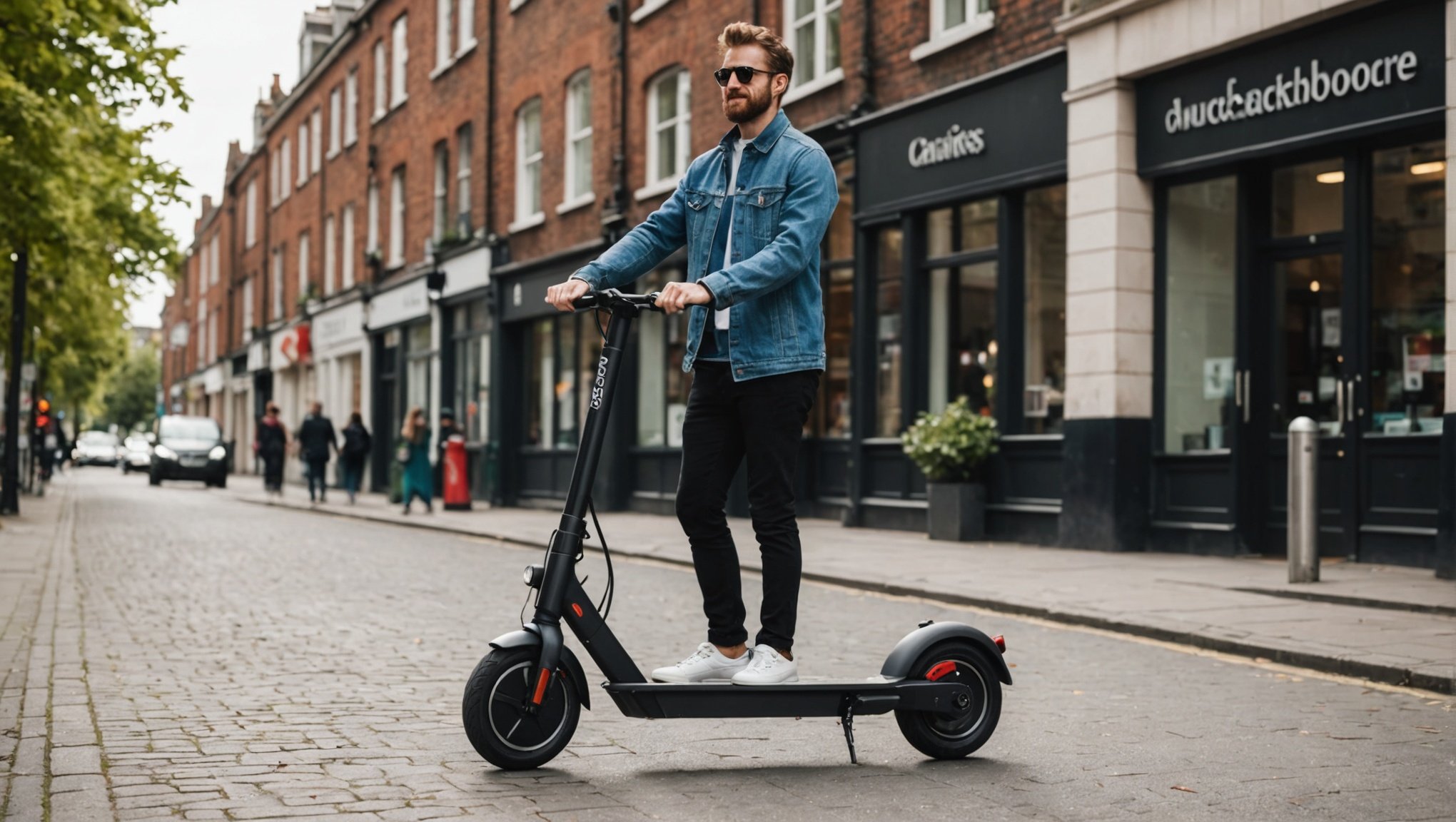Electric scooters are transforming urban transportation in the UK, offering a cleaner, more sustainable alternative to traditional vehicles. As cities grapple with pollution and traffic congestion, these eco-friendly options emerge as a viable solution. Not only do they reduce carbon emissions, but they also promote convenience and accessibility. Discover how electric scooters can reshape urban mobility while contributing positively to the environment and your wallet. Embrace the future of transportation and join the movement toward greener cities.
Environmental Benefits of Electric Scooters
Electric scooters represent a shift towards eco-friendly transportation by significantly reducing emissions compared to traditional vehicles. Unlike cars that rely on fossil fuels, electric scooters have a minimal carbon footprint, contributing to urban sustainability. They produce fewer emissions, aiding in the reduction of air pollution in congested city areas.
Have you seen this : Key Vitamins and Minerals Every UK Teen Needs for Healthy Growth During Puberty
Emissions and Energy Efficiency
Electric scooters are a beacon of energy efficiency. They consume less energy per mile than both cars and public transport. This makes them an attractive option for commuters looking to minimize their environmental impact. According to a recent study, electric scooters use approximately 1 kilowatt-hour of electricity for 100 miles, which is considerably lower than the energy consumption of cars.
Successful Integration in Cities
Several cities have successfully integrated electric scooters, enhancing their urban sustainability efforts.
Also read : Discover the Top Gentle Exercises for Seniors with Arthritis in the UK
- Paris: Reduced traffic congestion and emissions.
- San Francisco: Improved last-mile connectivity.
- Copenhagen: Promoted as a model for eco-friendly transportation.
These case studies demonstrate the potential of electric scooters to transform urban landscapes, offering a practical solution to environmental challenges. By embracing this eco-friendly transportation option, cities can move closer to achieving their sustainability goals.
Economic Advantages of Electric Scooters
Understanding the cost-efficiency of electric scooters
Cost Savings for Users
Electric scooters offer significant cost-efficiency compared to traditional transportation. Initial purchase prices are generally lower than those of cars. Maintenance costs are also reduced due to simpler mechanics and fewer moving parts. Additionally, electric scooters eliminate the need for expensive fuel, relying instead on affordable electricity.
Comparison to Other Transportation
When comparing electric scooter affordability to public transport and car ownership, the savings are substantial. A typical car incurs costs related to insurance, fuel, and maintenance. Public transport, while cheaper than cars, can still accumulate substantial costs over time. In contrast, electric scooters provide a more economical option for daily commuting.
- Purchase: Lower upfront costs
- Maintenance: Minimal expenses
- Fuel: Electricity is cheaper than gasoline
Long-term Economic Implications
The widespread adoption of electric scooters can lead to significant savings for urban infrastructure and government budgets. Reduced road wear and decreased demand for extensive public transport networks can result in lower maintenance costs for cities. This cost-efficiency supports the development of sustainable urban environments, making electric scooters a smart investment for both individuals and municipalities. By prioritizing transportation savings, cities can reallocate funds to other critical areas, enhancing overall quality of life.
Urban Mobility and Congestion Relief
Exploring the impact of electric scooters on city transport dynamics
Alleviating Urban Congestion
Electric scooters play a pivotal role in easing urban mobility by reducing traffic congestion. Their compact size allows them to navigate crowded streets efficiently, bypassing traffic jams that plague traditional vehicles. By offering an alternative to cars, scooters decrease the number of vehicles on the road, leading to smoother traffic flow and reduced commute times.
Enhancing Last-Mile Connectivity
In the realm of last-mile transportation, electric scooters excel by bridging gaps left by public transit systems. They offer a convenient solution for commuters to cover short distances from transit hubs to final destinations. This capability enhances urban mobility, making it easier for people to access work, shopping, and leisure activities without relying on cars.
Insights from Urban Planners
Urban planners advocate for the integration of electric scooters into existing transportation networks. A planner noted, "Electric scooters are a strategic tool in reducing traffic congestion." Their flexibility and ease of use make them ideal for last-mile transportation. Successful integration requires infrastructure adjustments, such as dedicated lanes and parking zones, ensuring scooters complement other urban transport modes effectively.
By strategically incorporating scooters, cities can enhance urban mobility, offering a sustainable solution to traffic congestion challenges.
User Experiences and Adoption Trends
Exploring the evolving landscape of electric scooter usage
Overview of User Demographics
Electric scooter usage is rapidly expanding across diverse demographics. Young professionals, students, and urban dwellers are the primary users, attracted by convenience and affordability. A recent survey revealed that user satisfaction is highest among those aged 18-35, who appreciate the eco-friendly aspect and ease of use.
User Satisfaction and Feedback
Feedback on electric scooter services highlights several areas of satisfaction and concern. Users appreciate the speed and flexibility scooters provide, particularly for short commutes. However, some express concerns about safety and availability. A user noted, "Electric scooters have transformed my daily commute, but I wish there were more designated lanes."
Trends in Rental Services
The market trends in electric scooter rental services show significant growth. As cities adapt to this new mode of transport, rental companies are expanding fleets and improving service reliability. The impact on urban commuting is notable, with scooters offering a viable alternative to traditional public transport.
- Convenience: Quick and easy access
- Affordability: Cost-effective for short distances
- Sustainability: Reduced carbon footprint
These trends underscore the growing adoption of electric scooters as a key player in modern urban mobility.
Future Implications for Urban Planning
Exploring the potential of electric scooters in shaping tomorrow's cities
Shaping Sustainable Urban Transport Policies
Electric scooters present an opportunity to revolutionize urban planning by aligning with sustainable transport policies. By integrating these eco-friendly vehicles into city infrastructure, policymakers can promote future mobility solutions that reduce emissions and enhance urban livability. A strategic approach to urban planning involves creating dedicated scooter lanes and parking areas, ensuring seamless incorporation into existing transport networks.
Recommendations for Policymakers
Policymakers should consider several strategies when integrating electric scooters into urban environments:
- Infrastructure Development: Establish dedicated lanes and parking zones.
- Safety Regulations: Implement comprehensive safety standards.
- Public Awareness: Educate citizens on responsible scooter usage.
These recommendations aim to foster a balanced approach, maximizing the benefits of electric scooters while addressing potential challenges.
Potential Challenges and Considerations
While electric scooters offer promising future mobility solutions, several challenges must be addressed. Urban planners need to consider the impact on pedestrian areas and ensure scooters do not contribute to congestion. Additionally, sustainable transport policies should include measures for maintaining scooter fleets and managing their lifecycle. By proactively addressing these challenges, cities can harness the full potential of electric scooters in urban planning.











